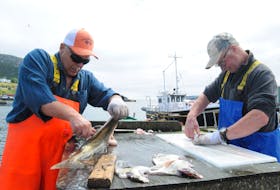ABERCROMBIE, N.S. — Paper Excellence is considering the option of keeping Northern Pulp in a hot idle, says Robin Wilber, president of Elmsdale Lumber Company and a member of Nova Scotia’s newly appointed forestry transition team.
But the company will need some co-operation to make it happen.
Wilber said he was talking with someone from the company as recently as Thursday and believes it is one of the best hopes of mitigating the damage that a long term closure of the mill would have on Nova Scotia’s economy.
Attempts to reach Northern Pulp for comment were unsuccessful.
“There’s of course thousands of jobs in the province at stake, and I know jobs are important, but the bigger story that hasn’t come out and it will over the next while is that the 30,000-plus woodlot owners in the province have just lost 30-50 per cent of the value of their land and their timber resources,” Wilber said.
Long term the consequences of that would be huge.
“It is bigger than anybody realizes,” he said. “It’s going to be a slow, painful demise.”
Outflow, not effluent
But to keep the mill in hot idle would require taking water from the Middle River and running it through the boilers to keep them going. This water (which would not contain chemicals) would then be released into Boat Harbour the same way treated effluent currently is before it flows through the Boat Harbour basin and out to the Northumberland Strait.
He said this wouldn’t contravene the Boat Harbour Act because it wouldn’t be effluent, but it would require approval from Pictou Landing First Nation.
He said the effects will be catastrophic if it’s not approved. Poor quality wood, which is currently used for pulp, wouldn’t be harvested if there isn’t a market for it, which will ultimately lead to poorer quality forests, Wilber said. Also contractors, who have financed equipment may be unable to keep up with payments.
“The forests are what are going to suffer over time.”
To him, it only makes sense that the province work with Northern Pulp to make the hot idle possible and expectations clear moving forward, so they can know exactly what information they need to provide to get the new treatment facility approved. To date, the company seems to have been forced to “try to hit a moving target,” he said.
Wilber said he is thankful that the premier reached out to him to be part of the transition team and said he will do his best at it. Kelliann Dean, deputy minister of intergovernmental affairs and trade, was previously announced as the team lead. Other members include:
- – Julie Towers, deputy minister, Department of Lands and Forestry
- – Simon d'Entremont, deputy minister, Energy and Mines
- – Ava Czapalay, acting deputy minister, Labour and Advanced Education
- – Don Bureaux, president, Nova Scotia Community College
- – Jeff Bishop, executive director, Forest Nova Scotia
- – Debbie Reeves, chairwoman, Large Private Non-Industrial Landowners of Nova Scotia
- – Greg Watson, manager, North Nova Forest Owners Co-op Ltd.
As the team moves forward with its work, individuals with further expertise may be engaged, as needed, the province stated in a release.
The transition team will hold its first meeting next Thursday. Initially, the team will have three key areas of focus:
- – advise on short-term interventions that can have the most effective impact for affected workers and businesses throughout the forestry sector
- – advise on potential areas of investment related to the $50 million transition fund
- – identify longer-term and innovative approaches for the forestry industry in Nova Scotia while ensuring an ecologically sustainable and globally competitive forestry sector for the province
"We know there is an impact on workers and the industry, so it is critical to have industry representatives at the table,” Premier Stephen McNeil said in the release. “I am grateful these individuals have agreed to work with government to ensure we identify the most effective ways to support the industry in the short term, and to provide advice on longer-term options for the future of forestry in our province.
The transition
Progressive Conservative Leader Tim Houston in recent weeks has been demanding more clarity about the forestry transition team and their role.
“This is a critical period. Thousands of Nova Scotians are concerned about their jobs, and since the government has raised the prospects of $50 million in transition money, it owes it to them to properly communicate the plan for this fund,” Houston said prior to the announcement of the transition team members. ”All of Nova Scotia needs this initiative to be successful, and we want to be helpful, so it is important that we understand the actual, stated objective of the team and its fund.”
In an interview this week, Houston said it’s important that a new market is found for Nova Scotia pulpwood.
“It’s a scary time for a lot of families,” Houston said. “It’s a scary time for a lot of businesses.”
Houston believes the money that’s been allocated for the transition fund is just a drop in the bucket when it comes to the impact that the closure will have on the economy.
“I don’t know if it was anything more than someone just picking a number out of the air,” he said.
He said the focus now needs to be on not only the immediate economic impacts, but how to help create stability in the next five and 10 years and moving forward.
“It’s a big part of the provincial economy and it won’t be replaced overnight.”
Since the deadline for closing the Boat Harbour effluent treatment facility was confirmed on Dec. 20, the province says members of the forestry industry have been continuously engaged to provide input on critical impacts and to gather suggestions from industry.
Also on Dec. 24, a toll-free line (1-888-315-0110) opened for individuals with immediate needs and questions. To date, more than 125 calls to the toll-free line have been answered; this line will remain open to continue to provide information tailored to individual needs including updates on available income assistance programs as well as employment and training opportunities.”
RELATED:









